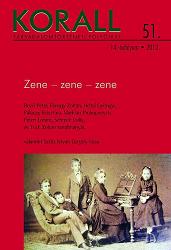A szalon mint a zenei és társasági élet színtere Jacques Offenbach Monsieur Choufleuri restera chez lui le… című operettjében
The Salon as the Scene of Music and Social Life in Jacques Offenbach’s Operetta M. Choufleuri restera chez lui le…
Author(s): Péter BozóSubject(s): History
Published by: KORALL Társadalomtörténeti Egyesület
Summary/Abstract: The study explores the ways, in which the salon is represented as the scene of contemporary Parisian music and social life in Jacques Offenbach’s 1861 M. Choufleuri restera chez lui le…(Mr. Cauliflower Will Be at Home). Since Siegfried Dörffeldt’s definitive work, the important role of opera parodies in early French operetta has become something of a truism. Opera parody as a genre looks back on a long-standing written tradition originating in the mid-seventeenth century. It is, however, important to examine what types of opera this particular Offenbach work parodies and how the parody works. Tercet No. 4 begins with verbatim quotes from Giacomo Meyerbeer’s Robert le diable, the most frequently played French grand opera of the nineteenth century (premiere: Académie Impériale de Musique, Paris, 1831), and Adrien Boieldieu’s popular opéra-comique, La dame blanche (premiere: Théâtre de l’Opéra-Comique, Paris, 1825). Later, Tercet No 6, entitled Trio italien de la malédiction, is a more aristocratic example of musical parody. In this, the lyrics, the plot and the music spoof Italian Risorgimento operas, particularly Vincenzo Bellini’s works. By ana-lysing these two types of musical parody, the study offers a brief summary of the genre, as well as a discussion of the institutional context of the creation of the piece and the social context of the parodied opera types. In M. Choufleuri restera chez lui le, the petit bourgeois M. Choufleuri chooses to stage Italian opera in his salon. His motive was that Italian opera was considered more aristocratic in Paris at that time than the bourgeois French grand opera quoted at the entrance of the young composer courting M. Choufleuri’s daughter. Besides references to the music scene at the time of the plot (1833), the ‘Italian Tercet’ performed in M. Choufleuri’s salon owes its contemporary relevance to recent events of musical and public life at the time of the premiere: the scandalous Paris performance of Wagner’s Tannhäuser, Jean Poniatowski’s Paris premieres, and the increasing popularity of Verdi operas in France.
Journal: Korall - Társadalomtörténeti folyóirat
- Issue Year: 2013
- Issue No: 51
- Page Range: 5-17
- Page Count: 13
- Language: Hungarian

